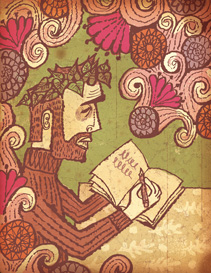Issue Archive
Commentary: From Olympus to Sinai

When I was growing up, God always found Himself locked out of our secular Jewish home on Long Island, New York.
Having a self-righteous Communist father meant that there was never any real chance of even a minor prophet slipping in through a back window. The very mention of prayer was enough to set Dad quoting Marx on opiates and the masses.
Given this Torah-free childhood, it is not surprising that my ideas about Judaism were mostly formed at friends’ bar mitzvas, which, in our suburban neck of the woods, never had much to do with real religious commitment.
Dad did allow Greek mythology into our house, since for him that wasn’t religion but ancient folklore, and by the time I was 7 or 8 I loved reading about Zeus, Pan and Prometheus. I desperately wanted to have the power to change into an eagle, be a centaur or look down at mortal men from the top of Mount Olympus. The Greeks taught me about the power of storytelling and gave me a love for reading. And I soon realized—with that vague tingling that signals revelation to a young boy—that their myths were about the potential for courage, cowardice, transformation and sexual desire inside me.
Like many young adults in the 1970’s, I moved on from Athena and Apollo to Shiva and Siddhartha. I completed my degree in comparative religion at Duke University in North Carolina in 1977.
Then, one summer day in 1989, I picked up a book of my Mom’s on Jewish manuscript illumination. The magnificent reproductions—medieval illustrations of Bible stories as well as depictions of demons, angels and bird-headed men—convinced me there might be a lot more to Judaism than I’d been led to believe.
When I read in Mom’s book that a school of illumination had flourished in 15th-century Lisbon, a city I had been to several times before to visit my father-in-law, an idea for a novel about an illuminator came to me. He later became Master Abraham in my first book, The Last Kabbalist of Lisbon (Overlook).
To write that novel I spent a year researching the Jews of Iberia, discovering Kabbala, the Jewish mystical tradition, along the way.
In my readings about Kabbala, I began to see that Jews throughout the ages have had a great deal to say about meditation, magic, reincarnation, union with God and other esoteric subjects that had fascinated me since I first read the Greek myths. One important idea that resonated strongly was that the only hands that God has to work changes on earth are our own. Or, as one of my characters says, “We shall make our own paradise or not have it at all.”
I’ve tried to put that wisdom to practice in my books by giving voice to those throughout history who’ve been systematically silenced, hoping that my narratives can become both a source of remembrance for those previously excised from history and—in their small way—an act of tikkun olam through social justice.
By now, Kabbala has become essential to me, and I’m constantly grateful that the Jewish lore associated with it gives me those same feelings of empowerment and revelation I had as a kid while reading about Mount Olympus. To be truthful, I still do not observe all the Jewish rules, but I’m thankful to have discovered that Judaism is about the possibilities in each of us for going on a spiritual journey toward freedom and fulfilment or—to use the Torah’s imagery, which is especially apt as we celebrate Passover—about journeying toward the Promised Land.
Richard Zimler’s most recent novel is Guardian of the Dawn(Bantam/ Dell). He can be contacted through his Web site atwww.zimler.com.










 Facebook
Facebook Instagram
Instagram Twitter
Twitter
Leave a Reply